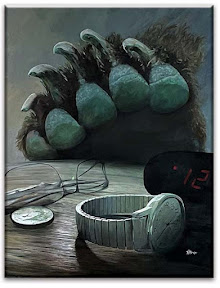
Finally, I finished the "Green Mountain Boys"flag. This flags history began with a very determined patriot named Ethan Allen. This post may be rather lengthy but I love the history behind this flag. After settling in Bennington Vermont, Allen became prominently involved in the struggle between New York and New Hampshire for control of the region. Following rejection by the New York authorities of an appeal that the region be established as a separate province, Allen organized a volunteer militia, called the Green Mountain Boys, to resist and evict proponents of the New York cause. He was thereupon declared an outlaw by the royal governor of New York. This was by all measures the beginning of an interesting collection of individuals. In painting this flag I noticed that there really is no pattern arangement for the stars on the flag. I am looking to see if they are part of a constellation or if there is a significance to the arrangement of the thirteen stars.
At the outbreak of the American Revolution, Allen and his force offered their services against the British. On orders from the Connecticut legislature, Allen, and the Connecticut soldier Benedict Arnold, with a contingent of the Green Mountain Boys captured Fort Ticonderoga early in the morning of May 10, 1775. Allen demanded surrender from the British commander "in the name of the Great Jehovah and the Continental Congress." Subsequently, as a member of the army of General Philip John Schuyler, he rendered valuable service in the American military expedition against Canada. He was taken prisoner near Montréal in September 1775 and held in confinement until exchanged in 1778. Following his release by the British, he returned to his home and was commissioned a lieutenant colonel in the Continental Army and major general of militia.Noted in a previous post The Green Montain Boys helped helped win the Battle of Bennington in Vermont.
The Green Montain Boys repeatedly harassed New Yorkers and, after the war, declared Vermont an independent republic. In 1778 Allen appeared before the Continental Congress in behalf of a claim by Vermont for recognition as an independent state. With his brother Ira Allen and other Vermonters he devoted most of his time thereafter to the territorial dispute. He negotiated with the governor of Canada between 1780 and 1783, ostensibly to establish Vermont as a British province. On the basis of this activity he was charged with treason, but, because the negotiations were demonstrably intended to force action on the Vermont case by the Continental Congress, the charge was never substantiated. He wrote a Narrative of Colonel Ethan Allen's Captivity (1779). Allen died in Burlington, Vermont, on February 12, 1789.
When New York relinquished its claims to the land, Vermont applied for statehood and in 1791 became the 14th state. It would have been interesting to meet Ethan Allen and discuss his views of George Washington and the forming new Republic.










No comments:
Post a Comment